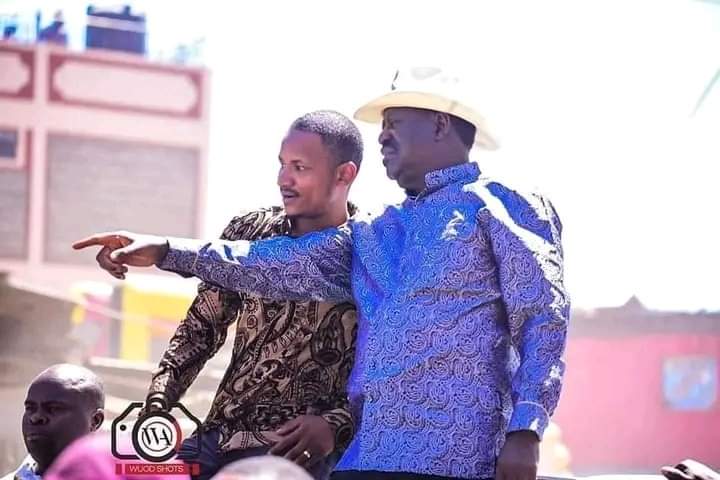Azimio la Umoja coalition leaders have renewed their criticism against the Kenya Kwanza administration and vowed to dislodge President William Ruto if Kenyans’ concerns are not addressed.They accused the government of jeopardising public health and food security.
Wiper leader Kalonzo Musyoka, Eugene Wamalwa (DAP-K), Murang’a Governor Mwangi wa Iria (Usawa Party), and ODM deputy party leader Wycliffe Oparanya regretted that farmers were anticipating poor harvests as patients died helplessly in hospitals because of the strikeKalonzo hinted that the mess caused by fake fertilisers, doctors’ strike and aggressive taxation would snowball to the fall of the Kenya Kwanza regime in 2027.
“If it is not fake fertiliser under Ruto’s regime then it is refusing to pay doctors. If not that then we are dealing with historically high taxation. We are alive to history and recall of the unpopular Watergate scandal in the US that sent then president home,” said Kalonzo..He claimed the fake fertiliser scam was an inside job that touched Ruto’s inner circle as no heads were rolling amid the national outcry from farmers.
Kalonzo challenged MPs to impeach Health CS Susan Nakhumicha and his Agriculture counterpart Mithika Linturi for incompetency.He said the fertiliser scandal combined with the rising cost of living occasioned by high taxation even on crops like sugarcane and avocado formed enough ground to “make a great scandal to take Ruto home”.
In recent political discourse, the Azimio La Umoja coalition, led by prominent Kenyan political figures such as Raila Odinga, has leveled accusations against President William Ruto regarding his alleged role in exacerbating issues within the health and agriculture sectors. These accusations stem from a complex interplay of political maneuvering, public perception, and policy decisions, which warrant a comprehensive examination to elucidate their implications.
Firstly, the health sector in Kenya has long been plagued by challenges, including inadequate infrastructure, understaffing, and limited access to essential services, particularly in rural areas. The COVID-19 pandemic further exposed systemic weaknesses, highlighting the need for robust healthcare reforms. Azimio leaders argue that Ruto’s leadership, either directly or indirectly, has failed to adequately address these challenges, resulting in a worsening healthcare situation for many Kenyans.
Critics point to instances of corruption and mismanagement within the health sector, alleging that Ruto’s political allies have been implicated in scandals that have diverted funds meant for healthcare into private pockets. Furthermore, the President’s purported focus on other political agendas, rather than prioritizing healthcare reform, has been cited as evidence of neglect.
Secondly, agriculture is a crucial sector in Kenya, providing livelihoods for a significant portion of the population and contributing to the country’s economy. However, it faces numerous obstacles, including erratic weather patterns, inadequate infrastructure, and limited access to markets and financing. Azimio leaders assert that Ruto’s leadership has failed to effectively address these challenges, resulting in stagnation and even regression in the agricultural sector.
Critics argue that Ruto’s agricultural policies have been shortsighted, focusing more on short-term gains rather than sustainable development. Allegations of favoritism towards certain agricultural players, including large-scale commercial interests at the expense of smallholder farmers, have also been raised. Additionally, the President’s alleged involvement in land-related controversies has further fueled discontent within the agricultural community.
Beyond specific policy failures, Azimio leaders suggest that Ruto’s broader political strategy has undermined both the health and agriculture sectors. They argue that his focus on divisive political rhetoric and efforts to consolidate power have diverted attention and resources away from pressing socio-economic issues, including healthcare and agriculture. Moreover, his purported involvement in destabilizing political maneuvers has created a climate of uncertainty, deterring potential investors and exacerbating existing challenges.
However, it is essential to acknowledge that these accusations are not without controversy, and Ruto’s supporters vehemently deny any wrongdoing on his part. They argue that the President has championed initiatives aimed at improving both the health and agriculture sectors, albeit facing significant obstacles, including opposition from rival political factions and bureaucratic inefficiencies.
Moreover, Ruto’s supporters contend that the accusations leveled against him are politically motivated, aimed at tarnishing his image and undermining his presidential ambitions. They highlight instances where the President has advocated for healthcare and agricultural reforms, including the distribution of subsidized fertilizers to farmers and the construction of new healthcare facilities.
The allegations made by Azimio leaders regarding William Ruto’s purported role in exacerbating issues within the health and agriculture sectors in Kenya are multifaceted and deeply intertwined with broader political dynamics. While critics point to instances of mismanagement, corruption, and neglect under Ruto’s leadership, his supporters argue that he has championed initiatives aimed at addressing these challenges.
Ultimately, the veracity of these accusations and their implications for Kenya’s future trajectory will depend on the outcome of ongoing political developments and the implementation of policies aimed at addressing the underlying issues within these critical sectors.The allegations against Deputy President William Ruto underscore broader concerns about governance, accountability, and transparency in Kenya’s political system.
They highlight the need for robust institutions and mechanisms to prevent corruption and ensure that public resources are allocated efficiently and equitably. Moreover, they raise questions about the effectiveness of current policies and strategies in addressing the root causes of poverty, inequality, and underdevelopment in the country.
If left unaddressed, the challenges facing the health and agriculture sectors could have far-reaching consequences for Kenya’s future prosperity and stability. A lack of access to quality healthcare can lead to increased morbidity and mortality rates, exacerbating poverty and hindering socio-economic development. Similarly, stagnation in the agricultural sector can undermine food security, exacerbate rural poverty, and contribute to social unrest.
Furthermore, the politicization of key sectors such as health and agriculture risks further polarizing society and undermining trust in democratic institutions. It is essential for political leaders to prioritize the common good over partisan interests and work collaboratively to address the pressing challenges facing the nation.
In conclusion, the allegations leveled against Deputy President William Ruto regarding his purported role in exacerbating issues within the health and agriculture sectors in Kenya underscore the need for comprehensive reforms and effective governance mechanisms. Addressing these challenges will require concerted efforts from political leaders, civil society, and the private sector to ensure that all Kenyans have access to quality healthcare and opportunities for economic advancement.

